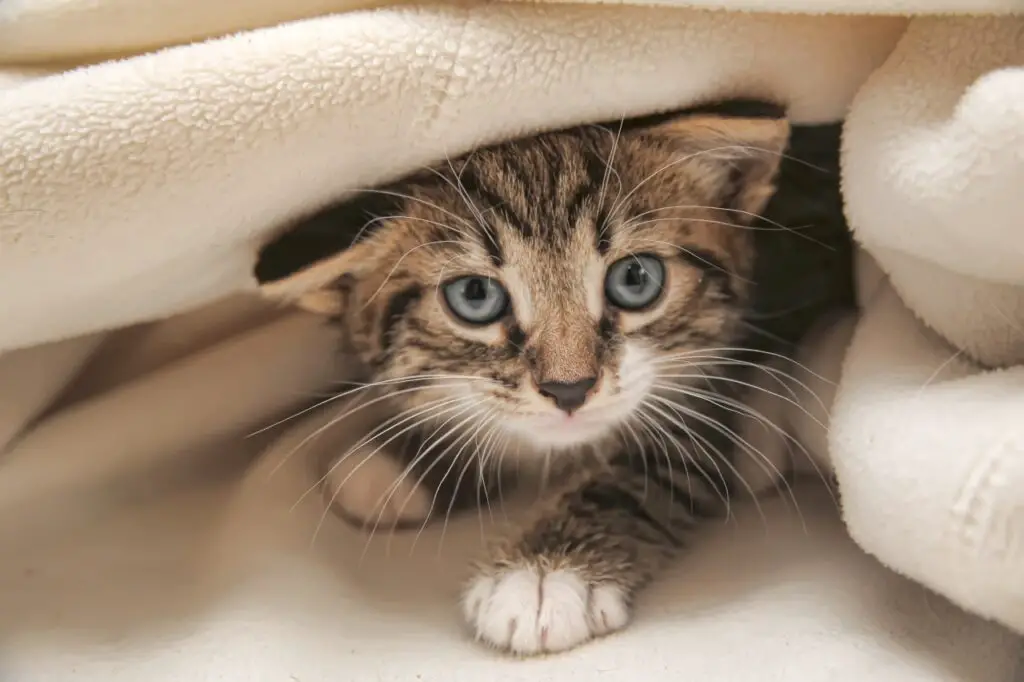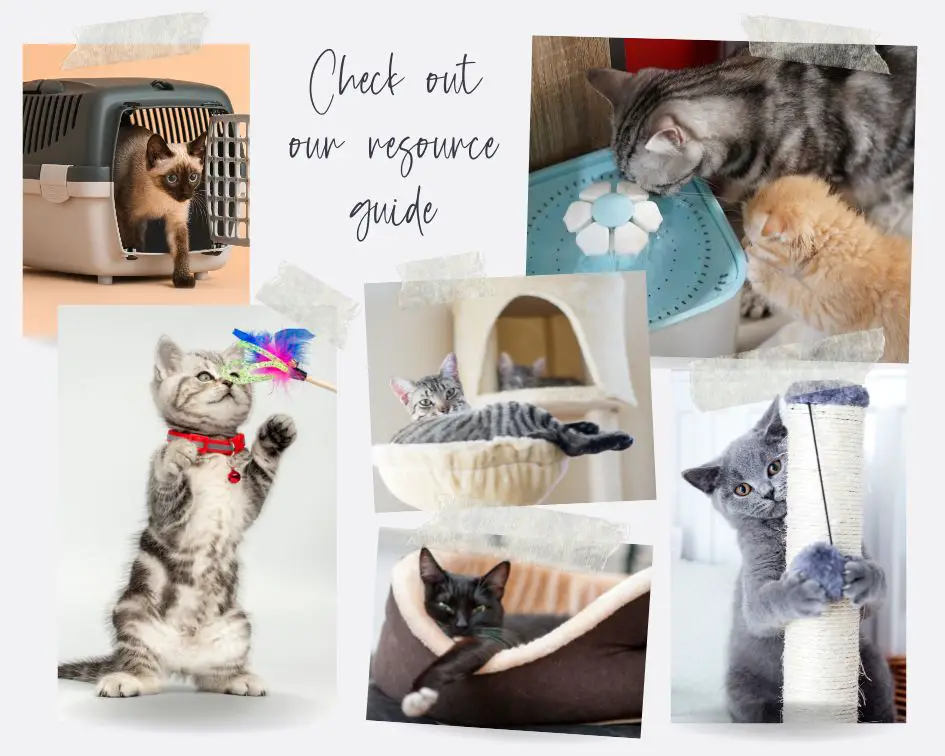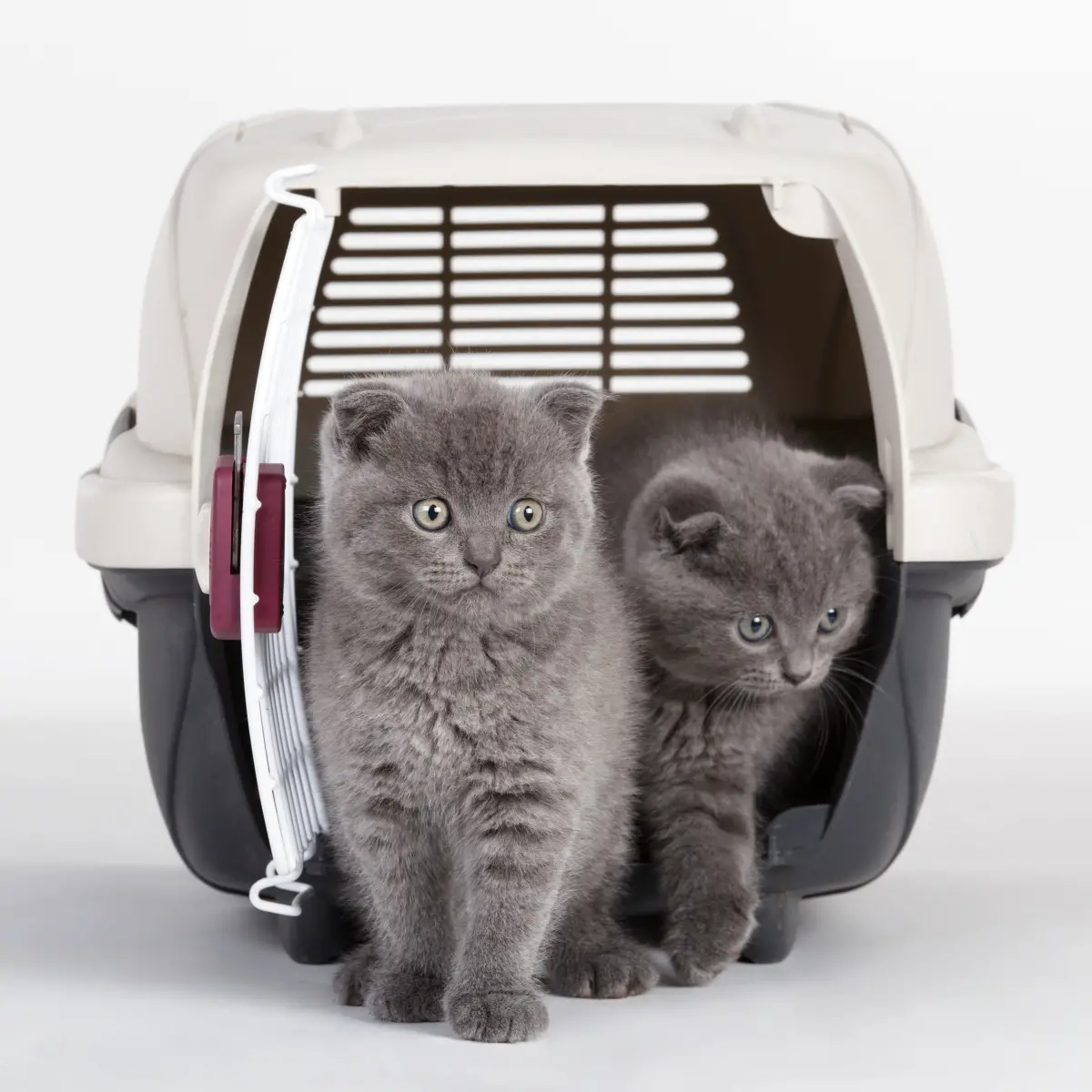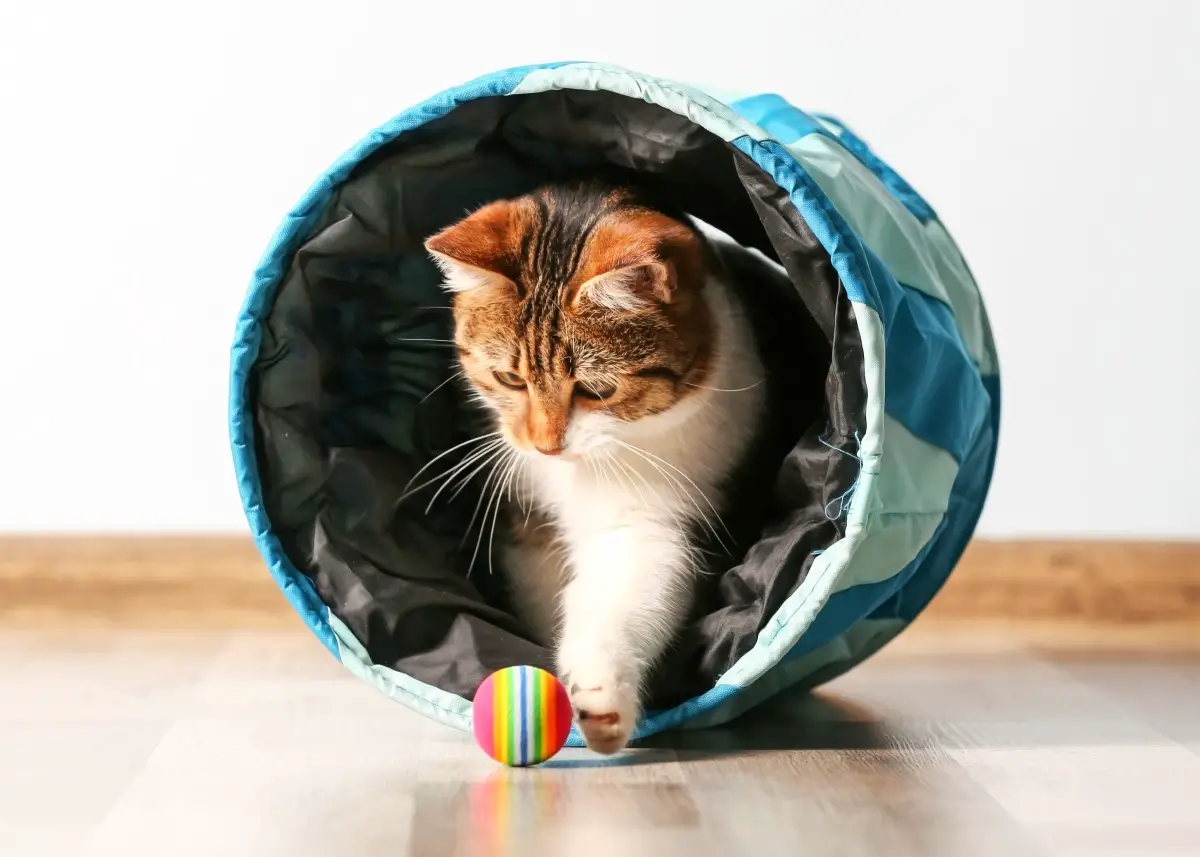What You Should Know Before Adopting a Kitten
This post may contain affiliate or referral links which means we may earn a sales commission. Please see our full affiliate disclosure here.
Adopting a kitten isn’t something to decide impulsively. It can be tempting to see a litter of kittens for adoption in a local online community or a sweet kitten in the adoption center at Petsmart and want to take them home. Here is what to know before adopting a kitten.
Who doesn’t love kittens? They are incredibly cute, but a kitten will not behave like a miniature adult cat.

You should consider some things when choosing to adopt a kitten instead of a cat. They are a ton of fun, but they are not low-maintenance pets.
Kittens are awesome, but they might not be the right choice for every person and every home. It’s best to be realistic about your expectations, lifestyle, budget, and patience level before deciding to bring an adorable kitten home.
Is adopting a kitten the right choice for you? Let’s find out.
Why Do You Want to Adopt a Kitten?
Shelters and foster homes are filled with homeless animals of all ages looking for their forever home.
Adopting a pet is rewarding both for the potential new cat owner and for the animal, but why do you want to adopt a kitten?
Impulse adoptions are a big reason why shelters and rescues are often filled with homeless cats. If you hadn’t seriously considered pet adoption until seeing a cute litter of kittens that someone is trying to find homes for, it might not be the right time.
If you have been thinking about getting a cute little kitten to join your family, then ask yourself some important questions first.
What to Consider When Adopting a Kitten
- Can you afford a kitten?
- Do you have time to spend with a kitten?
- Do you have time to train a kitten?
- Do you have the patience for a kitten?
- Do you have room for a litter box, scratching post, bed, etc.?
- Are all of your members in favor of adopting a kitten?
- Do you have other pets that may not get along with a kitten?
- Do you expect any major life events, such as a new baby or a move? If so, do these life events include a cat?
- Do you want a cat or just a cute little kitten?
- Are you prepared for how high-energy a kitten can be?
- Are you prepared for the possibility of a kitten scratching your furniture or climbing on your curtains?
As you can see, there are many things to consider when deciding whether you should bring a kitten into your home or not.
What I Wish I Knew Before Getting a Kitten
What to know before adopting a kitten is a loaded question without a quick, simple answer. Anyone considering adopting a kitten should thoroughly think it through.
If you haven’t lived with a kitten before, there are some things to know before getting a kitten from experienced kitten parents.
- Kittens need a lot of attention. They need attention both for their emotional development and for supervision. They don’t just want attention; they will demand it. Before getting a kitten, be sure that you have time to play, cuddle, and supervise them often.
- Kittens teethe. It’s true! Just like babies, kittens teethe, and they might chew on everything. To help with inappropriate chewing, give them kitten chew toys, boxes, and other things to chew on while teething instead of your electrical cords, fingers, etc. Also, don’t worry if you happen to find a random tooth on the floor or in their bed.
- Kittens will find and play with everything. A piece of paper, rubberband, fuzz, you name it. If it’s on the floor, they will find it. They also might eat things they aren’t supposed to, so keeping the floor clean is important when you have a kitten in the house.
- Kittens are expensive at first. If you don’t already have a cat, buying everything you need for a kitten is a fairly large initial investment.
- Kittens run. A lot! They have a ton of energy and will zoom around your house at all hours like you just gave them a pot of coffee. Allow them some open space to burn some of that excess energy.
- Kittens will climb on everything. A cat tower is a great thing to have because it will climb everywhere. Teaching your kitten to climb on a tower with places to scratch and hide will hopefully keep them from climbing on things they shouldn’t.
- Kittens will climb on you. Keep their claws trimmed regularly both to keep them from destroying furniture and to ease the pain when they climb up your leg.
- Kittens can be destructive. Having a kitten is like having a toddler who needs to learn what is appropriate and what isn’t. They may scratch furniture, climb long curtains, and knock things off tabletops. It is important to kitten-proof your home, tie up curtains, and have plenty of cat scratchers available before bringing a kitten home.
- Kittens are awesome. Finally, even though they are high-maintenance, having a kitten in your home is a lot of fun. They are cute, loving, and funny additions to any home. They are only kittens for a short time and will be big lazy cats in no time. Enjoy the fun while it lasts!

How to Prepare Your Home for a Kitten
Kitten-Proof Your Home
- I’m sure you’ve heard the old saying, “curiosity killed the cat.” This is even more true for kittens. They will get into anything and everything, so it’s important to be sure your home is safe for the kitten, and your possessions are safe from the kitten.
- Put breakable items away where your kitten can’t reach them, or put them away entirely until the kitten has gotten past its toddlerhood.
- Like toddlers, kittens teethe and will chew on anything they can. Cover your cords and chargers with cord covers, and put things like headphones away when you’re finished using them.
- Whether it’s your bedroom or another part of the house, section off an area in your home where the kitten can go at night so it doesn’t get into things it shouldn’t while unsupervised.
- Look around your home with the eyes of a curious kitty. Pay close attention to areas in your home where your kitten could get stuck and address them.
- Keep cabinet and closet doors closed when not in use, and be sure to double and triple-check that your kitten isn’t inside before doing so.
- If you have blinds or curtain tiebacks that your kitten will play with, secure them with a rubber band or on a hook so your kitten can’t reach them.
- If you have long curtains, tie them up off the ground until your kitten consistently uses their scratching post and is no longer climbing up on everything.
- Sweep or vacuum your floors often. Kittens will find and play with, chew on, or eat anything they can find, which is just about everything you don’t want them to.
- If possible, keep your laundry room area closed or your machines blocked off so your kitten doesn’t get stuck behind your washer and dryer.
- Keep your appliance doors and lids closed at all times when not in use. When in use, pay extra attention to your kitten.
- Do not leave food out on tables and counters. This includes the butter dish. Kittens shouldn’t eat human food in general, with some of it being dangerous to cats if ingested.
- Be aware of house plants! Many houseplants are toxic to cats or will give them an upset stomach if ingested. Check to see if your plant will be harmful to your kitten if they chew on it and if so, put it in a place where they can’t get to it or give it away to a catless friend and buy a cat-safe plant instead.
- Some cats like to use floor plants as litter boxes. If you have a cat-safe floor plant, cover the dirt with rocks, mesh, pinecones, fabric, or even foil to stop your cat from using your plant as a toilet.
- Flowers are often more dangerous to cats than plants. Think twice before picking up a pretty bouquet of lilies, daffodils, tulips, hydrangeas, etc., if you have a cat.
- It’s best not to allow your kitten in your garage. Poisonous substances are often kept in the garage, it’s filled with nooks and crannies where a kitten could get stuck, and your kitten could potentially climb up into your car’s engine.
- If you need to use ant or rodent traps in your home, be sure that your kitten can’t get to them.
Bringing Home a Kitten Checklist
Kittens are not inexpensive and need a surprising amount of stuff, even before you bring them home. This list is broken down into three categories: must-haves, should-haves, and may need to have.
Essentials to Buy for a New Kitten
There are some things you will need for a new kitten that we consider the essentials. These are the items you should have before bringing your cat home.
- Cat carrier – this is item number one. You will need a cat carrier just to bring your new kitty home.
- High-quality kitten food – wet food or a combination of wet and dry food is our recommendation. Starting your kitten off with the best food you can afford is best for your kitty’s long-term health.
- Litter box – you will need one litter box per cat in your home plus an extra if possible. Having a box on each floor of your home is ideal. Depending on how young your kitten is when you bring them home, you may want to look into litter boxes with a lower front.
- Kitty litter – a good quality clumping cat litter is a great option, but keep an eye on your kitten to be sure they aren’t eating it. If they are, you will want to switch to a non-clumping cat litter with larger granules until they are older.
- Litter scoop – we highly recommend a metal litter scoop instead of a plastic one. Plastic scoops can bend, be difficult to use, and break. Metal scoops are far more durable and easier to use.
- Litter mat – even non-trackable litter will track some. Also, kittens tend to jump out of their litter box more than their older counterparts, thus making more of a mess. A litter mat will keep those messes contained and easy to clean.
- Litter waste bags – if you don’t have plastic grocery bags hanging around the house, small waste bags for dirty kitty litter are necessary.
- Litter waste receptacle – whether you choose a Litter Genie or a small trash can, you will need somewhere to dump and throw away your kitten’s waste. Note: Solid waste must be thrown away instead of flushed even with flushable cat litter.
- Cat bowls – small cat bowls with low sides are optimal for kittens and older over a higher-sided bowl you may have. They are easier for kittens to use and will prevent whisker fatigue.
- Cat bed – even if you want to share your bed with your kitten, they will want their own place to sleep during the day.
- Cat toys – you can never have too many cat toys when you have a kitten. Try for a variety of toys such as stuffed toys to toss, wand toys, feather cat toys, ball tracks, and cat kickers to keep your kitten entertained so they won’t engage in undesirable behaviors.
- Cat scratchers – try scratching posts, scratching mats, or cat trees made of different shapes and materials to find out which one your kitten prefers. Having a variety will also cause less damage to your furniture.
Important Items You Will Need for a New Kitten
These are the items that we consider to be close to essential. You won’t need to purchase these things before bringing your new kitty home, but you will want to get them soon after.
What to Buy for Your Kitten As-Needed
While making the decision to bring home a kitten should not be made impulsively, with the proper thought and preparation, adopting a kitten is one of the best things you can do for them and yourself. This is just our not-so-biased cat-loving opinion, of course.
That said, we love kittens! Kittens are great and are a fun addition to any home. Adopting an adult cat is a fantastic option if you would love to have a cat in your home but don’t want the work of raising a kitten.








